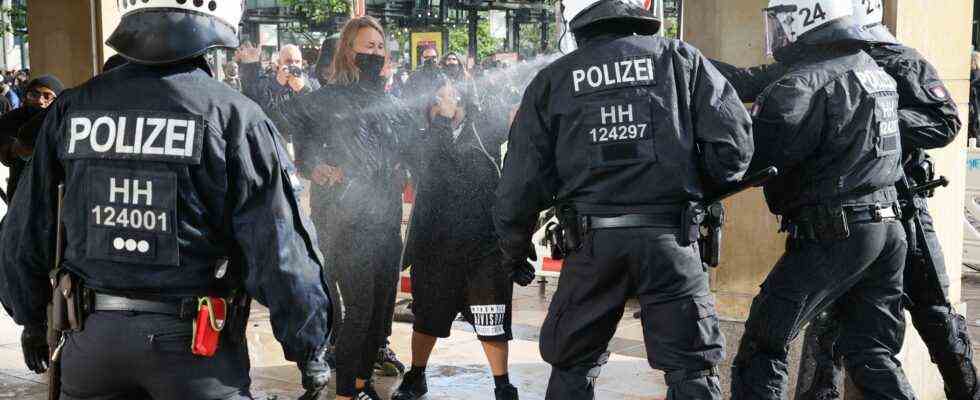Exclusive
Status: 07/22/2021 8:41 am
The worldwide debate about police violence after the death of George Floyd would be unthinkable without the existence of a video. In Germany, when it comes to film bans, the police rely on a paragraph, the application of which is controversial.
The police tried again and again with dubious reasons to prevent the publication of video recordings that show police violence. She argues after research by the ARDMagazine panorama often with Section 201 of the Criminal Code (StGB), which prohibits unauthorized recordings of the non-publicly spoken word.
Jurists criticize the application of this paragraph in such cases: “Basically, the official spoken word of a police officer to a citizen is a publicly spoken word and is therefore not covered by the corresponding criminal provision from 201 StGB,” said lawyer Fredrik Roggan from the Police College of the state of Brandenburg. “Because the police officer does not act as a person, as an individual, but as an official.”
Alleged film ban enforced by force
As a result of the police enforcement of the supposed film ban based on this paragraph, there is often considerable use of force, as happened in May 2020: 23-year-old Elisabeth from Frankfurt wanted to spend an evening with her friend in Kaiserslautern. They were sitting in a public square with a dozen others. There were too many in Corona times, the police found and checked the personal details.
“I then unpacked my cell phone and said that I would like to film everything to be on the safe side, in case something happens,” says Elisabeth. But the police officer didn’t want her to film. It was the beginning of a massive argument.
“He took the cell phone from me and when I tried to grab it, he pulled it away and immediately afterwards grabbed my head and hit the wall, several times, and shortly afterwards brought me to the ground.”
Authorities pursue law enforcement
The police director of Kaiserslautern, Ralf Klein, justified the operation: “The cell phone was taken from her because there was a crime in the room.” It is “usually” so that recordings with the cell phone include the sound. In his opinion, this complies with the criminal offense of recording the non-publicly spoken word under Section 201 of the Criminal Code. “Accordingly, it is forbidden to record confidential conversations,” said the police director.
This legal interpretation is also followed by the Chief Public Prosecutor of Kaiserslautern, Udo Gering. Elisabeth had recorded confidential conversations with her cell phone, so the police officer was allowed to take her cell phone, even violently, said Gering.
“One should still be able to express oneself impartially. Of course, recordings are made all the time, but it is not about any recordings, it is about recordings that are made without the consent of the person recorded. And that does not apply to professional statements, not just private ones only bedroom conversations, but also professional and professional statements, “explained the chief public prosecutor in Kaiserslautern.
Lawyers question criminal liability
The lawyer and police trainer Roggan contradicts this: “That would presuppose that a police check would be something intimate, so to speak,” said the criminal lawyer. In addition, during such operations there is often the so-called factual public – others can overhear. In the case of Elisabeth, there were 14 people. More and more courts follow this legal interpretation. But when it comes to action, only the interpretation of the police officers on site counts. Without a video, it is difficult to clarify afterwards whether there was an opportunity to listen and thus whether there was a factual public.
In essence, Paragraph 201 is not about image recordings, but about sound. It is forbidden to eavesdrop on phone calls or conversations in the bedroom, for example. This is one of the reasons why the factual instrumentalization of this paragraph to prevent filming has come under fire.
Police officers are filming themselves
After all, police officers often film themselves, for example with a body cam. “It is understandable that smartphones are a defense against body cams,” says police instructor Rafael Behr from the Hamburg Police Academy. “I advise my students to be a little more casual and thick-skinned. You can’t talk about so many secrets in public that you have to protect yourself with a paragraph against being filmed or having sound recordings made.” The bottom line is that he says to the students: “Act in such a way that everything you do can, in principle, be made public without harming you.”
In case of doubt, Behr himself would film, because without good evidence it is difficult for citizens to get their rights in court. So what is allowed, what is right? A legally clear landmark judgment seems long overdue.
Police violence: filming undesirable
Lea Eichhorn, NDR, July 22, 2021 8:47 am

